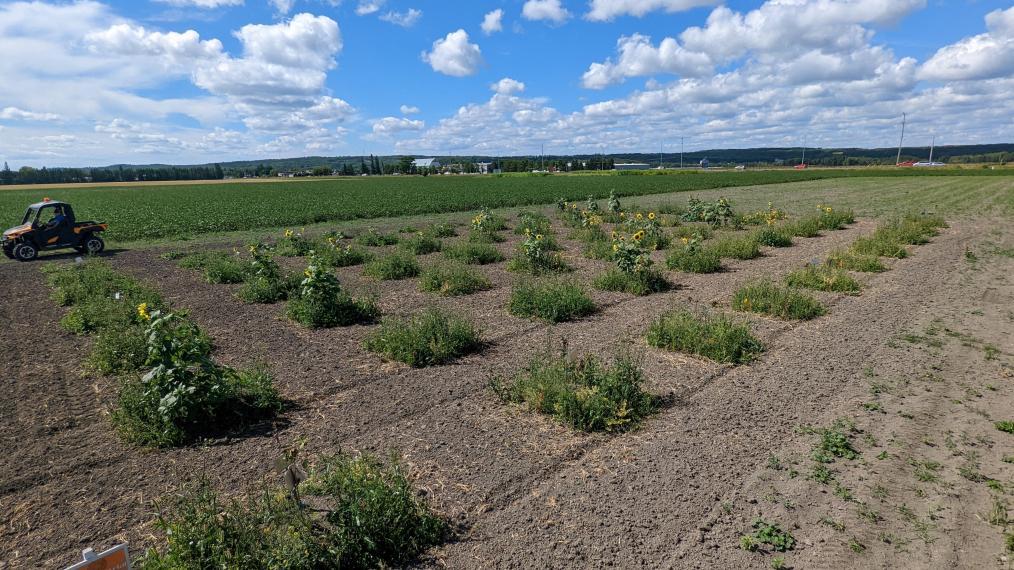U of G research group addressing challenges for farmers in Northern and Eastern Ontario

Conducting agronomic research to help farmers in Northern and Eastern Ontario is the goal of a new University of Guelph research group.
Dr. Joshua Nasielski, a professor in the Ontario Agricultural College (OAC) who joined U of G in 2019, started the Northern and Eastern Ontario Agronomy Research Group (NEO-AG) to address challenges faced by farmers in disparate parts of the province.
“Our research aims to answer questions of direct relevance to farmers in these regions and help them make informed decisions, while still addressing questions that scientists have around the world,” says Nasielski.
“Farmers in Northern and Eastern Ontario are challenged by unique geographic and soil conditions. NEO-AG works to understand and find solutions to challenges presented in these parts of the province.”
Northern Ontario farmers follow different crop rotations than Southern Ontario farmers, leading to unique pest issues. The group also uses specific crop management strategies to deal with frost in early spring and late summer.
Eastern Ontario experiences a new set of challenges each year. In 2022, this area had less drought than other areas of the province but saw more soybean aphids.
The new group has various projects under way at area research stations.
One project aims to reduce nitrogen losses in corn production. Nasielski is working with Drs. Dave Hooker, John Lauzon and John Sulik, all OAC professors, as well as Dr. Craig Drury, an Agriculture and Agri-Food Canada (AAFC) research scientist. The project began in 2021 and will conclude in 2023.
The team is working at four locations across the province, including the Ontario Crops Research Centre in Winchester. They are measuring volatilization, or the loss of nitrogen to the air. To conserve nitrogen and improve fertilizer management, the team looks at how nitrogen loss varies throughout the corn growing season.
“Farmers are always looking for ways to be more efficient with their time and money,” says Nasielski. “Improving fertilizer management in corn production will address this concern for farmers across Ontario.”
NEO-AG is also working with OAC professor Dr. Rene Van Acker and Dr. Kyle Bobiwash, an Indigenous professor at the University of Manitoba, to develop the Three Sisters project on intercropping and insects.
This project will continue into 2023 at numerous locations across Manitoba and Northern Ontario, including the Ontario Crops Research Centre sites in New Liskeard and Emo.
The Three Sisters project focuses on growing three crops – corn, beans and sunflower squash – separately and in different combinations. The research team is observing how crop combinations affect both beneficial and pest insect populations.
“We hope that by learning about the intricate relationships between crops and pests, we can provide farmers with recommendations about best cropping practices,” says Nasielski.
Since the group’s research is geographically dispersed, he says, teamwork is especially important.
“This research group is made up of numerous researchers, technicians and students across the province, so regular communication between researchers and technicians at the research stations is vital,” says Nasielski.
Dr. Holly Byker, Ian DeSchiffart and Ben Melenhorst, research technicians at the Ontario Crops Research Station in Winchester, are involved in the nitrogen project. The Three Sisters project includes Nathan Mountain and Melinda Drummond, both research technicians at the Ontario Crops Research Centre in New Liskeard, and Kim Jo Bliss, manager of the Ontario Crops Research Centre in Emo.
Both projects were funded by the Ontario Ministry of Agriculture, Food and Rural Affairs through the Ontario Agri-Food Innovation Alliance. The nitrogen research was also funded by the Grain Farmers of Ontario, the Natural Sciences and Engineering Research Council of Canada, and AAFC.